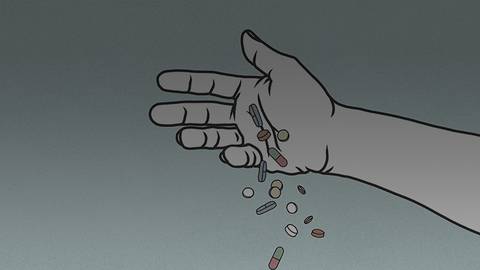Announcer:
You're listening to The Drug Report on ReachMD, hosted by Linda Bernstein, Pharm.D., Clinical Professor on the Volunteer Faculty of the School of Pharmacy, University of California, San Francisco.
Dr. Bernstein:
Welcome to The Drug Report with a special focus on the COVID-19 pandemic.
In an April 1st letter from Paul W. Abramowitz, Pharm.D., Chief Executive Officer of the American Society of Health Systems Pharmacists written to Vice President Mike Pence, ASHP appealed for urgent action to remedy shortages of supportive medications critical to ventilating and treating coronavirus patients. While the main focus of recent replenishment efforts has been to obtain personal protective equipment for healthcare workers and ventilators necessary to keep patients alive, the letter warned that ventilators will be rendered useless without an adequate supply of the medications – including opioids (e.g., fentanyl, morphine, hydromorphone), sedatives (e.g., midazolam, propofol), and paralytics (e.g., pancuronium, rocuronium, succinylcholine) that must be administered concomitantly with mechanical ventilation in critically ill patients, including those with COVID-19, to ensure the successful use of this life-saving supportive care.
Abramowitz stated, “It is imperative that manufacturing of these medications be increased immediately and available supply be allocated based on current projections of critical care patient volume, rather than based on historical allocations, which do not reflect current need.”The demand is outpacing supply due to the use of these essential medications and the need will grow exponentially over the next few weeks as case numbers climb nationally. The letter listed drugs that are needed to treat these critical care patients in the following categories: sedation/pain/palliative care; neuromuscular blockers; ICU agitation and supportive care; cardiovascular support; respiratory medications; GI/stress ulcer prophylaxis; hematology (DVT prophylaxis/treatment); antimicrobials; ARDS; IV fluids and electrolytes.
Multiple sources are reporting deepening shortages of drugs needed to help ventilate patients and keep them sedated. Among these are albuterol, neuromuscular blockers and sedatives, including fentanyl, midazolam and propofol; and vasopressors for septic shock, while orders increase exponentially. According to Dan Kistner, Pharm.D., senior vice president for pharmacy solutions at Vizient, a group hospital purchasing organization, rates at which hospitals traditionally had been able to fill orders for ventilator-associated drugs were 95%; now it’s more like 60 or 70% and that number is dropping everyday by 2 or 3 percentage points.
The demand for sedatives such as propofol and midazolam increased by 75 percent in March as the coronavirus crisis worsened. At the beginning of March, about 100 percent of hospitals’ orders for these drugs were filled, but that rate fell to as low as 48 percent by the end of the month. Furthermore, Kistner stated the combined fill rate for six ventilator-associated anesthetics together is now 63% (down from 95%). The analgesics (hydromorphone, fentanyl, and morphine) dropped to a 73% fill rate, he noted.
A report of a survey of acute care and nonacute long-term care, home infusion and retail pharmacy facilities by Premier, a healthcare improvement company, found 15 drugs used for COVID-19 care to be in shortage or close to being in short supply. Those with fill rates 65% or lower were chloroquine, hydroxychloroquine, azithromycin, cisatracurium, ribavirin, and fentanyl.
Since the COVID-19 crisis began, ASHP has been reaching out to federal agencies and Congress in an effort to protect the critical drug supply. For example, ASHP, along with the American Hospital Association, the American Medical Association, and others, sent the Drug Enforcement Administration (DEA) a letter requesting that they immediately increase allocation of annual production quota for supportive opioids to manufacturers and 503B outsourcing facilities. They have also been working closely with the Food & Drug Administration (FDA) to mitigate potential and ongoing shortages (such as, fentanyl, morphine, and hydromorphone that have been on FDA’s shortage list for months) and to request additional regulatory flexibilities for hospitals and 503B outsourcing facilities to compound essential medications, which have not yet been granted. Additionally, they were made aware that the Department of Health & Human Services released a request for information regarding manufacturing capacity for critical drugs but were dismayed to see that the medications necessary for ventilating patients were designated Tier 2. Failure to treat these drugs as anything other than absolutely essential will render ventilators worthless and exact a heavy patient toll.
The Drug Enforcement Administration has now announced they are taking steps to permit increased production and importation of various medicines that are in short supply and needed for COVID-19 patients who are placed on ventilators. They are increasing production quotas by 15% for several controlled substances, including fentanyl, morphine, hydromorphone, codeine, and list 1 chemicals, ephedrine, and pseudoephedrine. The DEA also plans to approve increased imports of ketamine, diazepam, midazolam, lorazepam, and phenobarbital.
For a list of current drug shortages see ashp.org and fda.gov.
For The Drug Report, I’m pharmacist Dr. Linda Bernstein.
Announcer:
To access this episode and others from The Drug Report, visit ReachMD.com/drugreport, where you can be part of the knowledge. Thanks for listening.


Facebook Comments